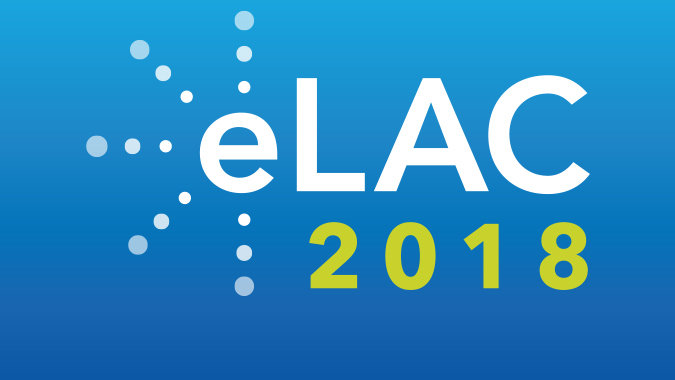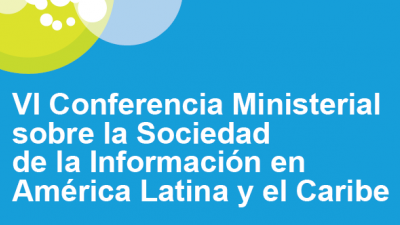Países de América Latina y el Caribe iniciaron proceso de discusión de la nueva agenda digital eLAC2020
Work area(s)
Alicia Bárcena, ECLAC’s Executive Secretary, and authorities from the region inaugurated the Preparatory Meeting for the Sixth Ministerial Conference on the Information Society today in Santiago, Chile.

Representatives of countries from Latin America and the Caribbean began today in Santiago, Chile the process of discussing the new regional digital agenda, eLAC2020, with the conviction that the technological revolution underway requires a constant updating of digital public policies, in line with the goals of the 2030 Agenda for Sustainable Development, and a commitment by all stakeholders.
The Preparatory Meeting for the Sixth Ministerial Conference on the Information Society in Latin America and the Caribbean was inaugurated by Alicia Bárcena, Executive Secretary of the Economic Commission for Latin America and the Caribbean (ECLAC); Yolanda Martínez, Chief of the Digital Government Unit of Mexico’s Ministry of Public Administration; Juan Sebastián Rozo, Colombia’s Deputy General Minister of Information and Communications Technologies (ICTs); and Rodrigo Ramírez, Chile’s Telecommunications Undersecretary.
Also present were Rubén Beltrán, Mexico’s Ambassador to Chile; Rita Claverie Díaz de Sciolli, the Guatemalan Ambassador to Chile; and Mario Cimoli, Director of ECLAC’s Production, Productivity and Management Division, along with other authorities and specialists.
At the meeting, which will conclude this Wednesday, August 9, participants will evaluate the commitments made in the current digital agenda, known as eLAC2018, which proposes using digital technologies as instruments of sustainable development, and will outline the areas of work and objectives of the eLAC2020 agenda, which will be approved during the Sixth Ministerial Conference, to be held on April 18-20, 2018 in Cartagena, Colombia.
In a scenario of low regional growth and rising protectionism in the world, “it is necessary to implement policies for structural change in Latin America and the Caribbean, prioritizing the adoption of digital technologies as catalysts of productivity, growth, inclusion and environmental sustainability,” said Alicia Bárcena, who highlighted the approval of four action plans since the First Ministerial Conference on the Information Society, which took place in Rio de Janeiro, Brazil in 2005.
These plans have consolidated the eLAC process as a regional agenda for defining national strategies and as a space for the exchange of good practices and cooperation, Bárcena stated. In that framework, she called for overcoming five big digital gaps related to infrastructure; innovation based on big data; the digitalization of production; training in digital abilities; and the articulation of digital and cybersecurity policies.
Yolanda Martínez, Chief of the Digital Government Unit of Mexico’s Ministry of Public Administration, affirmed that her country “is totally committed to the Digital Agenda of Latin America and the Caribbean” and expressed confidence that the preparatory meeting will deliver the necessary inputs for defining and strengthening the new eLAC2020 Agenda.
Juan Sebastián Rozo, Colombia’s Deputy General Minister of ICTs, invited those attending to participate in the next Ministerial Conference in Cartagena and proposed four core programmatic themes to build upon in the eLAC2020 plan: connectivity and digital services; digital transformation and the digital economy; digital government; and the digital ecosystem, with a special emphasis on critical infrastructure.
Meanwhile, Rodrigo Ramírez, Chile’s Telecommunications Undersecretary, asserted the need for a “convergent regulatory framework” capable of overcoming the mismatch that currently marks the region’s institutional actions. “If we are able to reformulate our development models, moving from extracting raw materials to exporting digital products and services with value added, we will be able to grow in a sustained way and achieve development,” he said.
According to data from ECLAC’s Regional Broadband Observatory, Latin America and the Caribbean has made sustained progress in terms of access: today, more than half of all Latin American and Caribbean inhabitants use the Internet (whereas seven years ago this figure only reached one-third) and access to mobile broadband has nearly doubled in the region, although it is still far from the levels seen in developed countries.
The meeting will include five debate panels on the issues of the role of digitalization and innovation in implementation of the 2030 Agenda, the regional digital market, data-based innovation, the industrial Internet and inclusive digital development, in addition to the discussion session regarding the eLAC2020 Digital Agenda.
Related event
Related content

Autoridades y especialistas examinarán en la CEPAL propuestas para una nueva Agenda Digital en la región
Del 7 al 9 de agosto se realizará en Santiago, Chile, la Reunión preparatoria de la Sexta Conferencia Ministerial sobre la Sociedad de la Información de América Latina y el Caribe.

Reunión preparatoria de la Sexta Conferencia Ministerial sobre la Sociedad de la Información de América Latina y el Caribe
Intervención de Alicia Bárcena, Secretaria Ejecutiva de la CEPAL.
Subregional headquarter(s) and office(s)
Country(ies)
- Latin America and the Caribbean
Related project(s)
Contact
Public Information Unit
- prensa@cepal.org
- (56 2) 2210 2040



